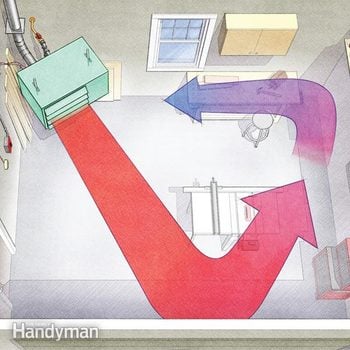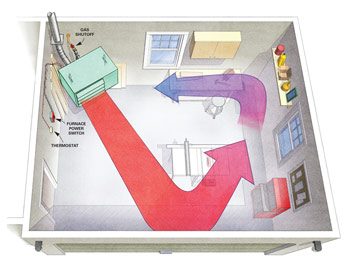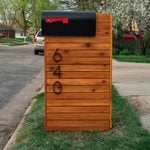What Is the Best Gas Garage Heater?
Updated: Dec. 08, 2022Pick the right heating unit for your shop

Garage Heating Systems
The Best Garage Heater
We recommend a ceiling-mounted, gas-fired, forced-air unit garage heater. Some installers recommend infrared shop heaters because they heat objects instead of air. You’ll be warmed and so will the floor (if it’s free of vehicles). But you won’t be happy with the cold tools inside your tool chest. Infrared shop heaters are no more energy efficient than forced-air heaters, and they cost about twice as much.
The least expensive alternative is a portable kerosene or propane garage heater. But a kerosene garage heater and a propane garage heater are not the best choice. They require ventilation (think “open door”) and pump gallons of water vapor into your garage. That means working with a constant cold draft and putting up with smelly exhaust and burning eyes. Then there’s the issue of rust on your tools from all that humidity. A kerosene or propane garage heater just isn’t a good solution if you work in the garage regularly. So bite the bullet and buy a ceiling-mounted, forced-air unit heater that’s rated for residential use (building inspectors won’t OK an industrial unit in a residential garage). Plan to spend $500 to $650, plus the cost of professional installation.
Advanced DIYers can install a natural gas garage heater, which involves gas lines, venting and electrical work. But don’t skip the permits and inspections for a natural gas garage heater. An improper installation of a natural gas garage heater can kill you. Check with the inspector to see if installing a natural gas garage heater is even legal in your area to perform your own gas hookups.
If you’ll be working on wood projects or using spray finishes, choose a heater with a separate combustion chamber. They burn fresh outside air instead of the dust or paint-laden air inside a garage. There’s a slight fire danger using a conventional heater, and the dust and paint particles will cause burner problems that require service calls.
Some natural gas garage heaters are more compact than others and can be mounted within 1 in. of the ceiling. So review the dimensions of the shop heater and calculate the installed height to ensure proper headroom.
To help size the shop heater and estimate monthly energy costs, consult manufacturers and dealers. Most residential garages require heaters with a capacity of 30,000 or 45,000 Btu. Your heater size depends on the garage’s square footage, ceiling height and insulation, so don’t guess. And don’t oversize your heater—especially if you intend to leave it on (even at a reduced temperature) all winter. An oversize unit heater cycles too often and wastes energy.
If you have an attached garage, mount the thermostat on the common wall between the garage and the house and away from the heated airflow. In a detached garage, mount it on the wall below the heater.




